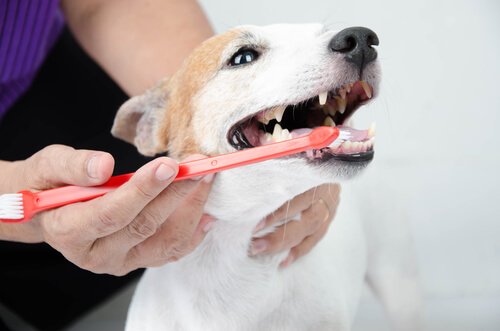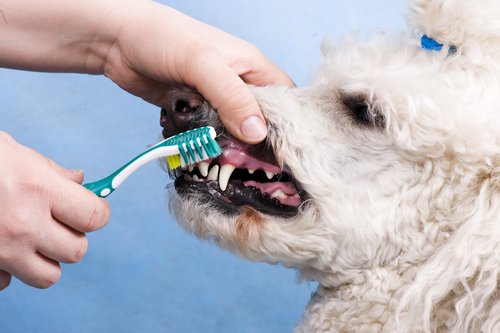7 Canine Dental Care Tips

Dogs need good oral care just like humans! Continue reading to learn about canine dental care.
Oral hygiene is a very important topic for dog owners. You can prevent a dog’s teeth from going bad by practicing proper hygiene. Therefore, you can keep your dog from having bad breath and other dental problems. There are many canine dental care tips that are necessary to keep in mind.
If people don’t take care of a dog’s dental needs, then he’ll be exposed to several risks. One of them is the probability of having periodontitis. In addition, other diseases may happen when oral bacteria gain access to the blood. These bacteria give rise to arthritis, kidney infections, blood diseases, and more. Therefore, maintaining your dog’s oral health is a must.
7 Basic Tips for Canine Dental Care
1. Diet
Your dog’s food is very important because it’s a basic part of taking care of your dog’s oral health.
Dogs should eat good quality food. Having them eat the right food can be the difference between a healthy or unhealthy mouth. The right food for a dog should be dry and consistent because it helps strengthen the animal’s teeth. It will also prevent food from getting stuck and building up between the teeth.

2. Brushing teeth
This is another very important topic in canine dental care. Just like humans, a dog’s teeth should be brushed daily. This will guarantee the removal of any food caught inside the dog’s mouth. Ideally, you should start brushing when your dog is a puppy, so your dog will get used to this good habit.
3. Toys
It’s also important to give your dog good toys. Preferably, they should be made of natural rubber or nylon. They will help prevent tartar from building up. They strengthen the teeth and are called teeth cleaners. Their consistency and hardness help clean the animal’s mouth completely.
4. Dental treats
These are bones or treats that improve the dog’s teeth. Still, it is important to make sure that they are good quality. Make sure they don’t contain toxic components. Always ask a veterinarian before buying them. When you combine brushing and dental treats, you could correctly take care of your animal’s dental health.
5. Oral inspections
You should periodically examine your dog’s mouth. You’ll need to check all of his teeth. This is simple to do; you just need to move the animal’s lips. It’s also important to check if the animal doesn’t have tartar build-up or jaw damage. If you see something abnormal in your pet’s mouth, take him to a vet immediately.
6. Canine dental care for small breeds
Small and medium-sized breeds are much more prone to developing mouth diseases. Good food is essential for such cases. Also, you must take the pet to the vet on a regular basis. That way the vet will be able to rule out any oral anomalies.
7. Veterinary care
The dog must visit the vet on a regular basis. The veterinarian will be able to examine the animal in a more appropriate and professional manner. It is extremely important that every dog has primary veterinarian care. Whenever there is a problem, you should always seek professional attention.
Providing proper canine dental care is not that difficult. So, it’s important to remember that animals use their mouths a lot.

Dogs do everything with their mouths– eating, playing, and exploring. Pets need the same health care just as people do. It’s a good idea to schedule regular veterinarian visit. A specialist can detect any illness or problem on time. That way the animal can receive appropriate treatment.
You must visit the vet any time there’s an oral abnormality. As you can see, your pet’s dental problems are not so different from those of humans. Dental brushing and oral care should be performed daily.
In conclusion, dogs are just like humans because they require dental appointments and have the veterinarian check out their teeth.
